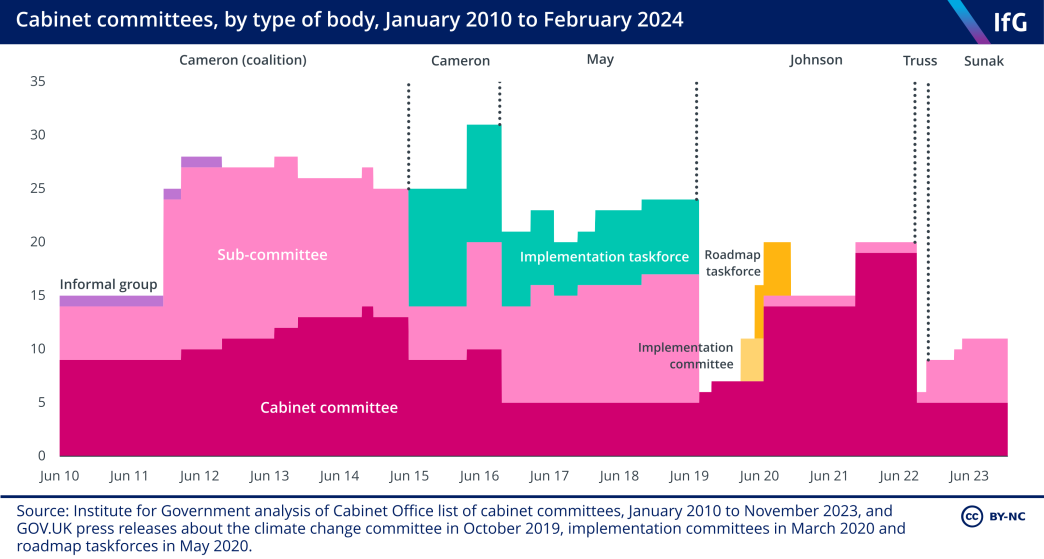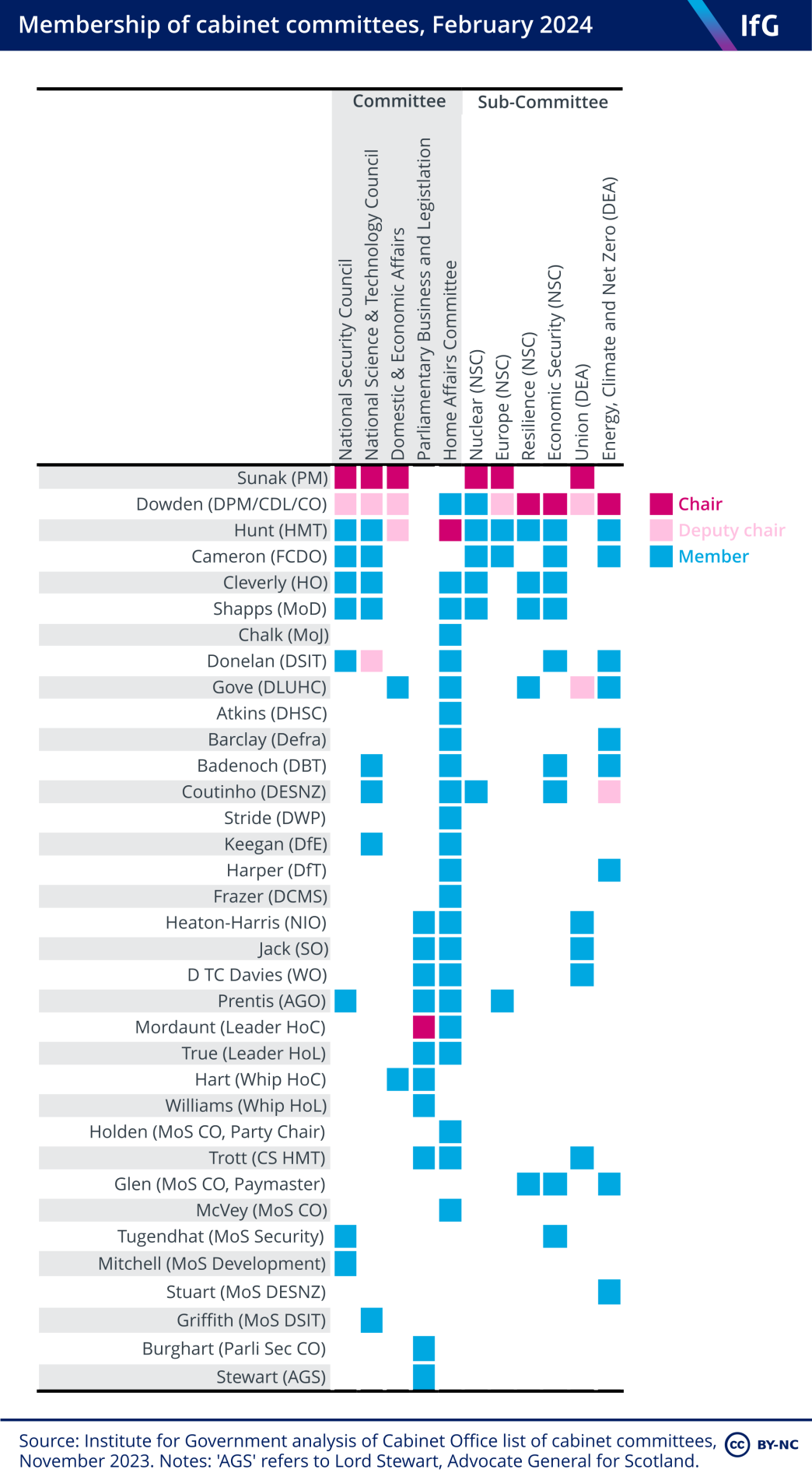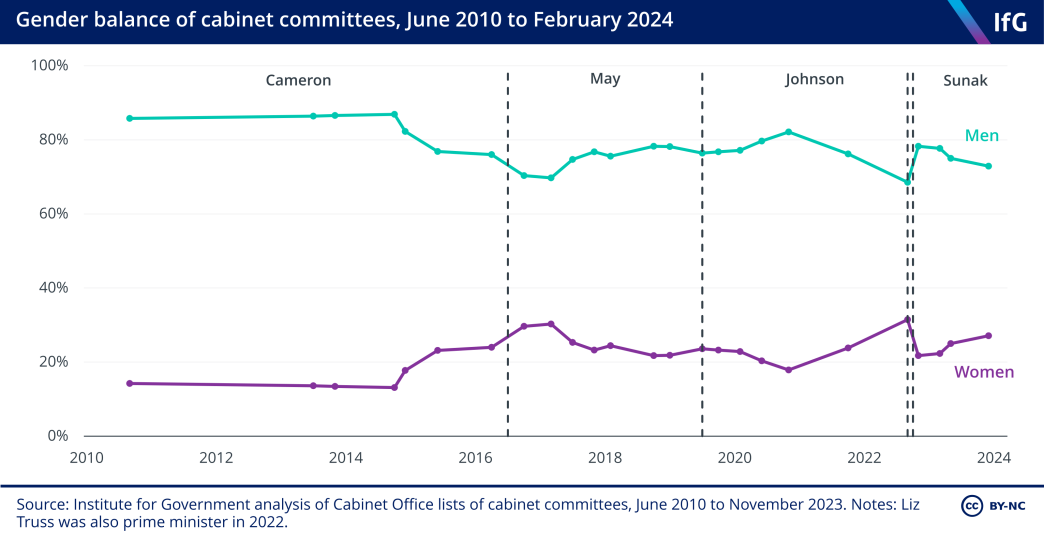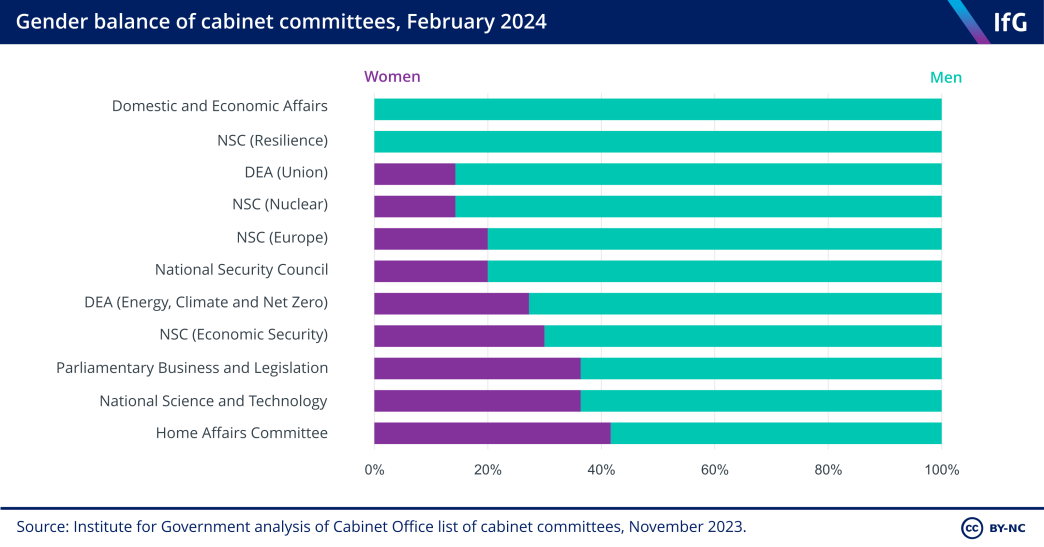Cabinet committees
Cabinet committees are groups of ministers that can “take collective decisions that are binding across government."

What are cabinet committees?
Cabinet committees are groups of ministers that can “take collective decisions that are binding across government”. 20 Cabinet Office, List of Cabinet Committees, GOV.UK, 16 September 2010, retrieved on 18 March 2020, www.gov.uk/government/publications/the-cabinet-committees-system-and-list-of-cabinet-committees They are partly designed to reduce the burden on the full cabinet by allowing smaller groups of ministers to take decisions on specific policy areas. Cabinet committees have been in use since the early 20th century. Some committees meet in person to discuss issues; however, many committees make decisions by correspondence, with ministers “writing round” to each other to seek agreement to their proposals.
Cabinet committees can be used for detailed discussion and decision-making, or merely to rubberstamp decisions made elsewhere, depending on the disposition of the prime minister.
Cabinet committees should not be confused with select committees, which are parliamentary bodies that scrutinise what government does.
How are cabinet committees established?
Prime ministers can create and abolish cabinet committees at will. They also decide the remit and membership of the committees.
Some committees are relatively permanent: the Parliamentary Business and Legislation Committee has existed since 2010 to “consider issues relating to the government’s parliamentary business and its legislative programme”. It is similar in scope to the Legislation Committee which existed under Gordon Brown. 21 Cabinet Office, Ministerial Committee on Legislation, 3 November 2008, retrieved on 18 March 2020, web.archive.org/web/20081120051054/http:/www.cabinetoffice.gov.uk/secretariats/committees/l.aspx Likewise, the National Security Council was placed on a formal committee footing in 2010 and has remained in existence since, except for a brief interlude under Liz Truss, when it was merged with other foreign policy committees to form a single Foreign Policy and Security Council. 22 Sabbagh D and Mason R, ‘Truss axes national security council, sparking ‘talking-shop’ concerns’, 23 September 2022, retrieved 27 February 2024, www.theguardian.com/uk-news/2022/sep/23/truss-axes-national-security-council-sparking-talking-shop-concerns
Others are more transient, reflecting the prime minister’s priorities or the political context. In 2015, David Cameron abolished the Coalition Committee and Banking Reform Committee and introduced a new committee on Europe. Theresa May similarly established several Brexit-related cabinet committees, while Boris Johnson introduced two Covid-19 committees.
What subjects do cabinet committees cover?
As of February 2024, there are five cabinet committees and six sub-committees:
- The National Security Council (NSC), which has four sub-committees, covering nuclear, Europe, resilience, and economic security
- The National Science and Technology Council
- The Domestic and Economic Affairs committee (DEA), which contains two sub-committees – on the union and energy, climate and net zero
- The Parliamentary Business and Legislation committee (PBL)
- The Home Affairs Committee (HAC)

How has the number of cabinet committees changed over time?
Boris Johnson initially cut the number of cabinet committees when he took office, but by late 2021 there were 20 committees in existence. Many of these had been created to confront challenges like the Covid-19 pandemic and the resettlement of Afghan refugees. The increase also reflected the decision to divide existing committees into separate ‘strategy’ and ‘operations’ committees.
When she took office in September 2022, Liz Truss eliminated most committees, including the NSC and the National Science and Technology Council. This reduced the number of committees to just six, including one sub-committee.
Some of these cuts were reversed by Rishi Sunak when he became prime minister in November 2022. Sunak re-established the NSC and the National Science and Technology Council, expanded the Home Affairs Committee and introduced sub-committees on the union and Europe. In spring 2023 he created two new sub-committees of the NSC, focusing on resilience and economic security.
Who sits on cabinet committees?
Cabinet committees primarily consist of cabinet ministers, though a number of more junior ministers are also members. Membership is at the prime minister’s discretion, so it may reflect individual ministers’ relationship with the prime minister as much as the policy areas they are responsible for.

The prime minister chairs all six of the committees he sits on. The deputy prime minister, Oliver Dowden, sits on 10 of the 11 committees or sub-committees – the most of any minister – while the chancellor, Jeremy Hunt sits on nine.
One cabinet committee – the Home Affairs Committee – consists of every full member of cabinet except for the prime minister and the foreign secretary.
Most ministers who attend cabinet (but who are not full members) are also invited to sit on cabinet committees.
- The attorney general, Victoria Prentis, sits on four
- The chief secretary to the Treasury, Laura Trott, and paymaster general, John Glen, sit on three
- The chief whip, Simon Hart, and security minister, Tom Tugendhat, sit on two
- Minister without portfolio, Esther McVey, and development minister, Andrew Mitchell, both sit on one
In addition, a small number of committees contain members who do not attend cabinet itself:
- The Lords chief whip, Baroness Williams, Cabinet Office parliamentary secretary, Alex Burghart, and the advocate general for Scotland, Lord Stewart, all sit on the Parliamentary Business and Legislation committee
- Science minister, Andrew Griffith, sits on the National Science and Technology Council
- Energy security minister, Graham Stuart, sits on the Energy, Climate and Net Zero sub-committee
The exact membership of committees – or even their existence – is sometimes unclear. There is often a delay between changes to committees and the publication of a new committee list. For example, between the November 2020 and October 2021, there were reports of new cabinet committees but no lists were published during this period. 28 BBC News, ‘Downing Street sets up new unit to focus on keeping the UK together’, 25 February 2021, www.bbc.co.uk/news/uk-politics-56193743
What does the gender balance in cabinet committees look like?
As with other areas of government, women tend to be underrepresented in cabinet committees. No women sit on the Domestic and Economic Affairs committee, for instance.

In February 2024, women held 29% of cabinet committee places, down from a high of 31% under Liz Truss. This disparity reflects the lack of women in cabinet – just 10 out of the 32 ministers who attend cabinet are women – and the complete absence of women among the great offices of state.

What do ministers think about cabinet committees?
Although during interviews for our Ministers Reflect archive, former ministers frequently speak about cabinet committees, they are widely viewed in a negative light. Indeed, Jim Knight, minister for schools and learning under Labour, and Lynne Featherstone, minister of state for crime prevention during the coalition government, refer to them as a “waste of time”.
Across the political spectrum cabinet committees have been labelled as “tick-boxy” (Ed Vaizey – Conservative, former minister of state for culture and the digital economy) and “a box ticking exercise” (Jim Knight – Labour).
Ministers also frequently mention that cabinet committees are not forums for proper decision making. John Healey, previously economic secretary to the Treasury under Tony Blair, claimed that “There were very few cabinet committees where, in my experience… decisions that haven’t essentially been prepared in advance were taken.” David Hanson, a former minister of state for Northern Ireland, added that “really the decisions were being made somewhere else”.
What other ministerial committees are there?
The government can also create other types of ministerial committees. In June 2015, David Cameron introduced implementation taskforces, designed “to monitor and drive delivery of the government’s most important cross-cutting priorities” 29 Cabinet Office, Prime Minister's Office, 10 Downing Street, and The Rt Hon Oliver Letwin, Cabinet Committees and Implementation Taskforces membership list, GOV.UK, 3 June 2015, retrieved on 18 March 2020, www.gov.uk/government/speeches/cabinet-committees-and-implementation-taskforces-membership-list , although these were discontinued when Boris Johnson became prime minister in July 2019.
In March 2020, Boris Johnson announced the creation of four new ‘implementation committees’ 30 Prime Minister's Office, 10 Downing Street, Cabinet Office, Department of Health and Social Care, Foreign and Commonwealth Office, HM Treasury, Department for Business, Energy and Industrial Strategy, and The Rt Hon Boris Johnson MP, New government structures to coordinate response to coronavirus, GOV.UK, 17 March 2020, retrieved on 18 March 2020, www.gov.uk/government/news/new-government-structures-to-coordinate-response-to-coronavirus in response to the coronavirus (Covid-19) pandemic. These four committees focused on healthcare, the general public sector, economic and business, and international response. On 13 May 2020, the Cabinet Office also announced the creation of five new ‘roadmap taskforces’ 31 Cabinet Office, Government announces roadmap taskforces, GOV.UK, 13 May 2020, www.gov.uk/government/news/government-announces-roadmap-taskforces – committees intended to guide certain sectors of the UK economy out of the Covid-19 lockdown.
The government can also convene inter-ministerial groups (IMGs). These cannot take binding decisions but can support policy development and decision making where collective cabinet agreement is not required.
They bring together ministers to ‘support the collective policy development process, including feeding into a relevant cabinet committee, and support decision-making by ministers within departments where collective agreement is not required’. 32 Cabinet Office, Freedom of Information Response no. FOI326282, 22 August 2018, retrieved on 15 September 2022, www.instituteforgovernment.org.uk/sites/default/files/FOI-response-FOI326282-list-august-2018.pdf Although not binding on cabinet, their existence is approved by the prime minister.
The government does not publish details about IMGs – we obtained information via a Freedom of Information request (following an initial refusal and then a delay).
All of the information in this explainer is based on the latest government update on cabinet committees, which was published in December 2023.
- Topic
- Ministers
- Keywords
- Cabinet Cabinet committees
- Administration
- Sunak government Truss government Johnson government May government
- Department
- Cabinet Office
- Public figures
- Rishi Sunak Liz Truss Boris Johnson Theresa May
- Publisher
- Institute for Government